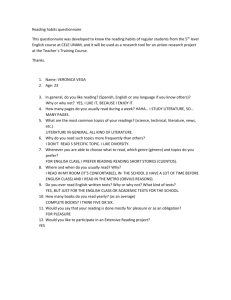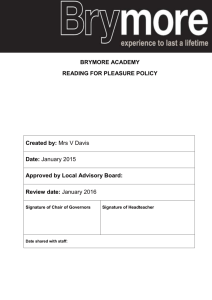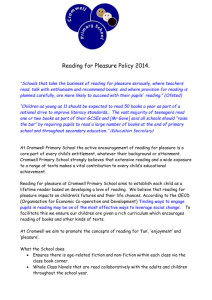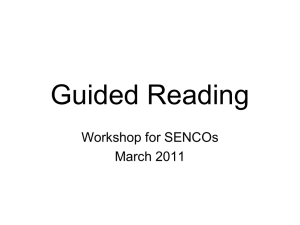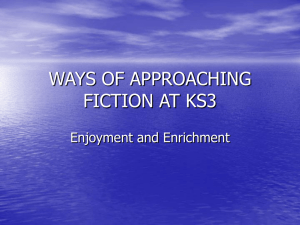The Case for Reading for Pleasure
advertisement
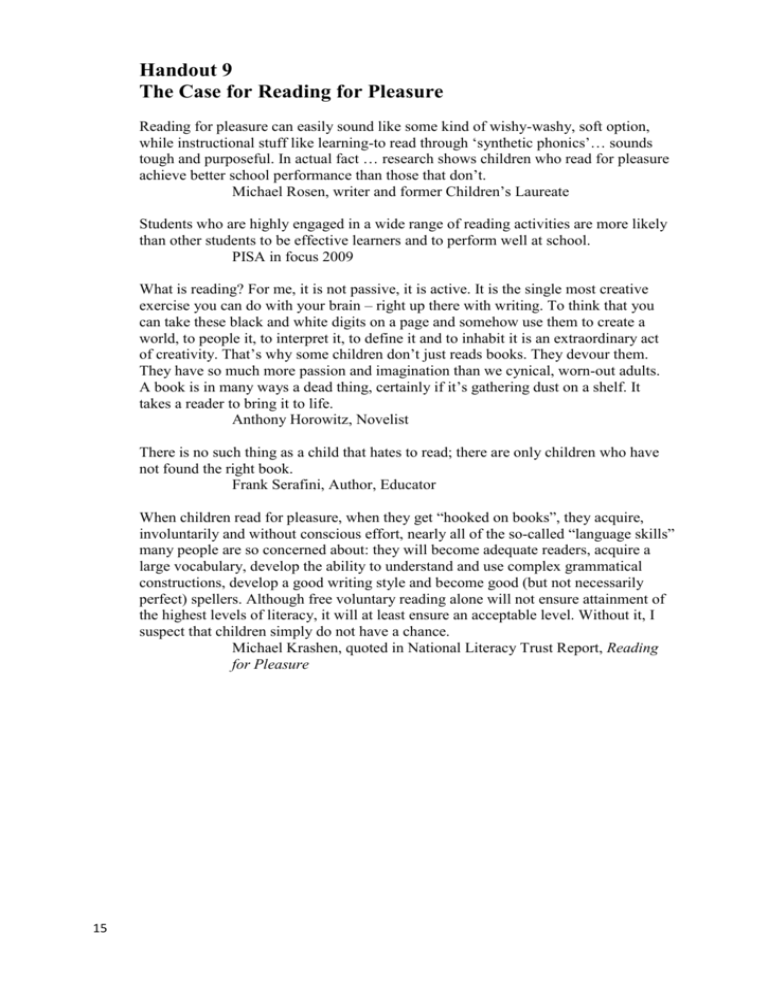
Handout 9 The Case for Reading for Pleasure Reading for pleasure can easily sound like some kind of wishy-washy, soft option, while instructional stuff like learning-to read through ‘synthetic phonics’… sounds tough and purposeful. In actual fact … research shows children who read for pleasure achieve better school performance than those that don’t. Michael Rosen, writer and former Children’s Laureate Students who are highly engaged in a wide range of reading activities are more likely than other students to be effective learners and to perform well at school. PISA in focus 2009 What is reading? For me, it is not passive, it is active. It is the single most creative exercise you can do with your brain – right up there with writing. To think that you can take these black and white digits on a page and somehow use them to create a world, to people it, to interpret it, to define it and to inhabit it is an extraordinary act of creativity. That’s why some children don’t just reads books. They devour them. They have so much more passion and imagination than we cynical, worn-out adults. A book is in many ways a dead thing, certainly if it’s gathering dust on a shelf. It takes a reader to bring it to life. Anthony Horowitz, Novelist There is no such thing as a child that hates to read; there are only children who have not found the right book. Frank Serafini, Author, Educator When children read for pleasure, when they get “hooked on books”, they acquire, involuntarily and without conscious effort, nearly all of the so-called “language skills” many people are so concerned about: they will become adequate readers, acquire a large vocabulary, develop the ability to understand and use complex grammatical constructions, develop a good writing style and become good (but not necessarily perfect) spellers. Although free voluntary reading alone will not ensure attainment of the highest levels of literacy, it will at least ensure an acceptable level. Without it, I suspect that children simply do not have a chance. Michael Krashen, quoted in National Literacy Trust Report, Reading for Pleasure 15 Observations from Teachers in Partner Schools The class library was really successful and I'm going to use it with 1st years again next year. The students chose books independently with no help at all from me. On the whole the students were really enthusiastic about it. There were a few students who were quite reluctant readers and didn't like the books they'd chosen, so other students in the class recommended books to them which they thought they'd like. Some students are less enthusiastic on the whole than others but most loved it. There were waiting lists for a couple of the books- The Hunger Games and issassins were especially popular. I told them they had to bring the books back last week but some students asked if they could hold on to them for a couple of days so they could finish them. One student stayed behind after class as she'd taken out Noughts and Crosses and hadn't got to read it as she'd been studying and asked me if she could keep it over the summer so she could read it as she'd read the start and really liked it. Our school library is used full-time as a classroom so is not easily accessible, so this meant I could promote reading in a feasible way and logistically it was much easier than taking a class to the library. I have used the class library. I made it a focus of the classroom. I found that, given choice, students respond very well. They enjoyed the autonomy of choosing their own texts, recommending and receiving recommendations. Compared to the other first year classes, my students read a considerably higher number of texts. My students also enjoyed arguing about the books, which was good/bad/indifferent and why. I encouraged dialogue between them, and I could see them developing their own ideas and defending them. A particularly engaged and heated discussion took place after I took the class to see the film version of The Hunger Games. Over half of the class had read the novel and had their own connections and reasons for liking/disliking it. The film versus novel debate raged and it seems that (unsurprisingly) the majority preferred the book. I think that this was an important experience for the students, as they tend to watch films rather than read books. Interestingly, when asked about their experiences of the class library, the students said "It was better than doing work". They don't view reading as work, and I think that this is an important area that has been and should continue to be tapped into. I never underestimated the importance of reading in a person's life, but I definitely think I neglected it in my teaching. As an English teacher I think that I have been guilty of over-analysis of texts that are to be 'exam' texts, and didn't feel that encouraging independent reading was part of my remit. I have completely changed this opinion. I feel it should be a requirement that I keep abreast of young adult fiction, particularly in these times when it is such a growth industry. I just have the books there and the kids come and take them. The Hunger Games is flying out the door. I love it! It’s good for me too. You are constantly getting them to write and assess, write and assess… My God, in first year they should be enjoying it. We should be creating a book-rich environment. I had a lot of reluctant readers in there and they are enjoying it. They just come in, they barely give me a nod, they just sit down with their books, they’re so into it… and I’m hovering in the background or they come and talk to me about their book. 16
